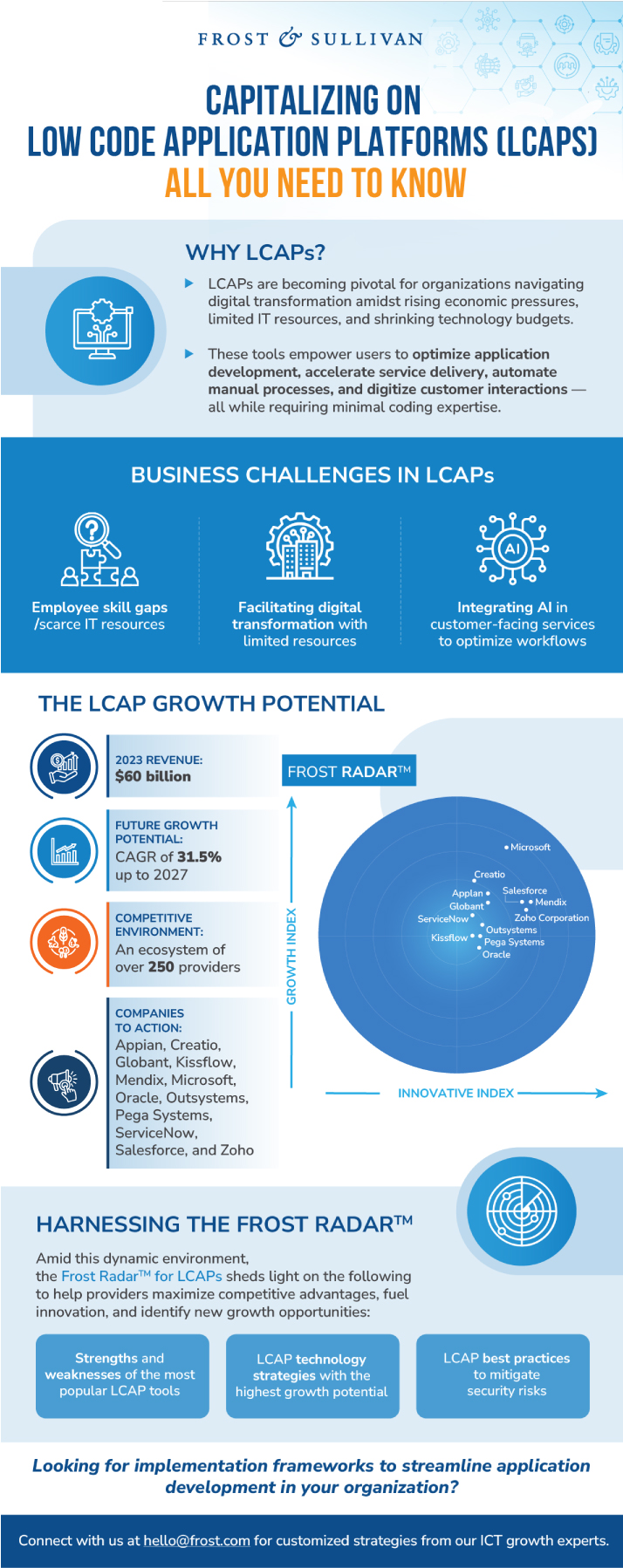Businesses are under immense pressure to digitalize operations while keeping pace with disruptive technologies and the shortage of skilled IT resources. As a result, the global LCAP landscape is evolving, catalysed by changing customer demands, and the need for improved work-flow automation across job functions. Moreover, with a projected CAGR of 31.5% through to 2027, the rising potential of LCAPs underscores their role in tomorrow’s tech-focused operating environments.
Today, the integration of generative AI (GenAI) is optimizing LCAP security, intelligent process automation, and anomaly detection. Further, as organizations strive to tackle platform customization, interoperability, and scalability concerns, innovative solutions are poised to reshape the future of app development. However, before capitalizing on emerging opportunities, technology providers face the imperative of tackling vendor-lock in issues associated with traditional LCAP solutions.
What’s Driving LCAP Growth?
- The push for hyperautomation.
- The prioritization of customer experience through speedy application/ service deployment.
- The need for combating macroeconomic uncertainty.
Download now to access best practices and latest growth opportunities in the LCAP ecosystem.
Which Strategic Imperatives Steer the LCAP Revolution?
Hyperautomation through LCAPs presents unique challenges for businesses due to the complexity of integrating new technologies into existing systems. This necessitates high-quality, consistent data, and effective change management to ensure smooth adoption. Additionally, security and compliance risks impede growth. Now, providers that factor in the following imperatives into their growth plans are well equipped to thrive through the LCAP revolution:
- Internal Challenges: Pivoting growth strategies to combat macroeconomic shifts, competitive intensity, and dwindling IT resources, as organizations strive to streamline legacy operations and accelerate digital transformation.
- Disruptive Technologies: Embedding AI-first development assistance, GenAI, and Natural Language Processing (NLP) into LCAPs to deliver personalized customer experiences, automate vulnerability detection, enable intelligent document processing, and generate appropriate codes.
- Innovative Business Models: Implementing subscription-based business models that empower non-IT teams to independently design innovative services and automate workflows, eliminating the need to rely on professional developers.
To know more about LCAP implementation strategies, click here.
Mapping best practices in LCAPs is essential for ensuring successful implementation, scalability, and long-term value. For providers, adhering to these practices helps deliver reliable, secure, and well-differentiated solutions that align with industry standards, fostering trust and customer satisfaction.
For customers, following best practices ensures that innovative platforms can be effectively utilized to meet varying business needs, optimize app development, and enable faster digital transformation. Thus, by focusing on the following, both providers and customers can maximize the potential of LCAPs:
- Leveraging GenAI and natural language inputs for autonomous process optimization, code generation, app ideation, and anomaly detection.
- Verticalizing LCAP tools, components, services, and solutions for different industries (and geographical regions) by focusing on pre-built app templates, flexible application programming interfaces (APIs), and connectors.
- Harnessing AI to maximize platform security, mitigate bugs, and reduce code vulnerabilities, while ensuring app compliance with regional regulations.
LCAP: Companies to Action
- Microsoft’s Power Apps is a leading platform, with robust features and functionality that are valuable to citizen and professional developers.
- Mendix delivers rapid low-code innovation, enjoying a strong growth trajectory because of its diverse partnership strategies with other competitors in this space.
Download now for detailed LCAP provider profiles and competitive strategies.
As the LCAP revolution continues to unfold, businesses and providers must embrace strategic imperatives, best practices, and emerging technologies like GenAI to drive success. By addressing challenges and focusing on security, scalability, and innovation, they can unlock the full potential of LCAPs, thereby transforming the future of app development.





